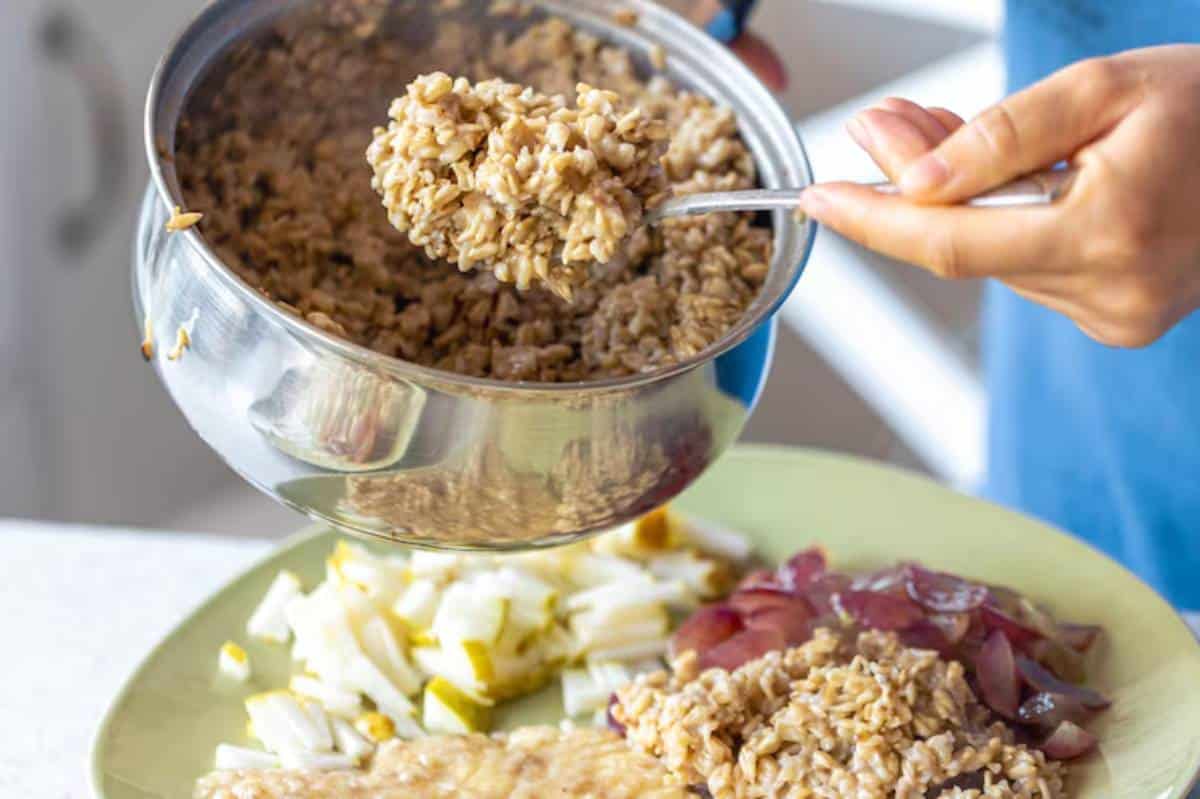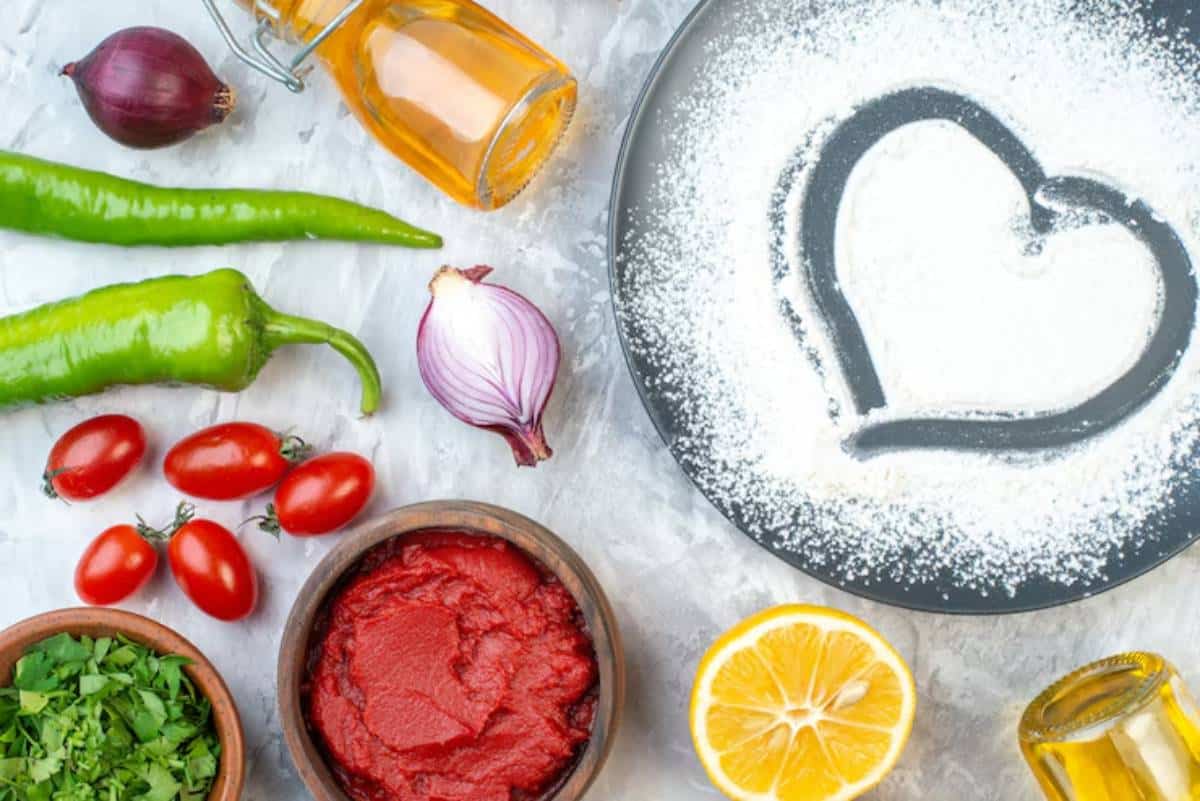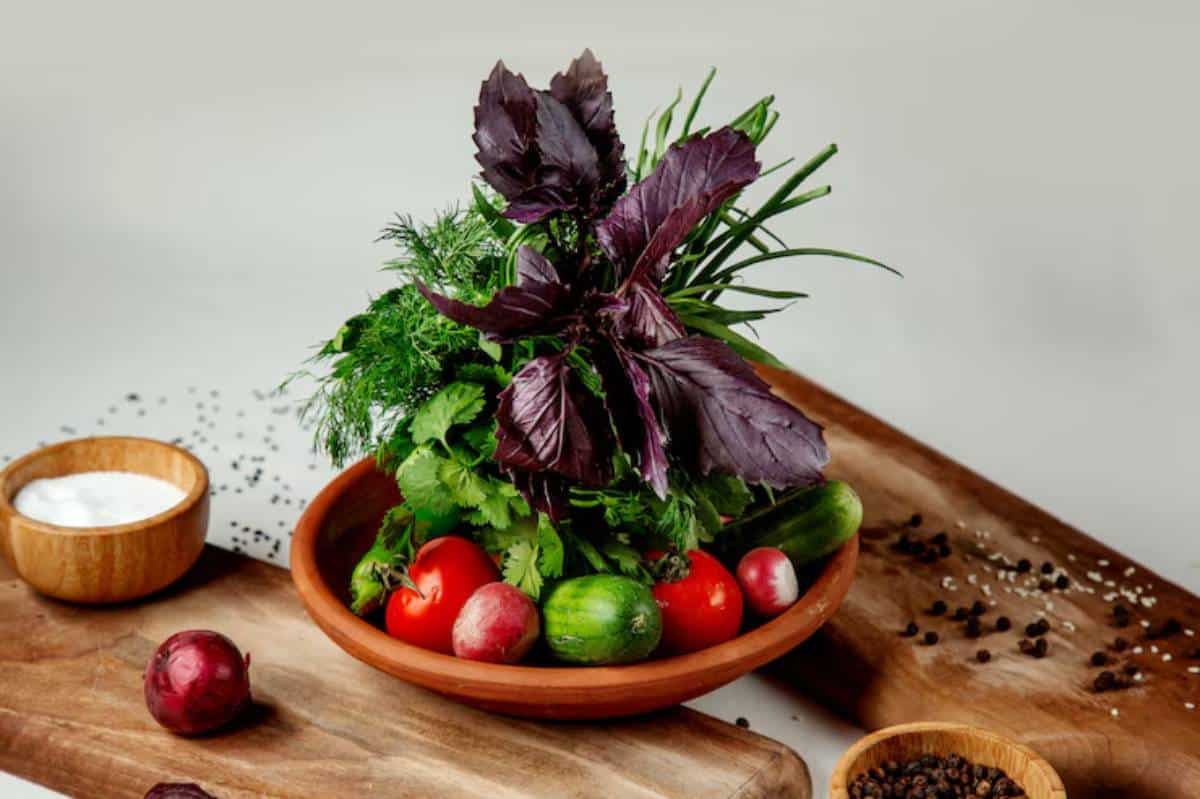
How to Use Fresh Herbs in Mediterranean Cooking
If the Mediterranean had a scent, it would be the heady blend of rosemary, thyme, mint, basil, and oregano warming in olive oil. Fresh herbs are key to Mediterranean cooking. They turn simple ingredients into lively, tasty dishes. Mediterranean fresh herbs add taste and nutrition. You can scatter them over a dish or mix them into a marinade.
In this guide, we’ll look at essential herbs from the region. We’ll share tips on how to use them. Plus, we’ll provide fresh herb recipes that showcase their benefits. You’ll also discover how herbs can replace excess salt and fat while enhancing every bite.
From weeknight salads to slow-cooked stews, let’s explore the green essentials that make Mediterranean cooking so flavorful.
Why Use Fresh Herbs?
Taste Without Compromise
- Herbs like oregano and basil add depth without calories
- Balance acidity, enhance sweetness, and bring freshness
Nutritional Perks
- Rich in antioxidants and anti-inflammatory compounds
- Support digestion, immunity, and circulation
A Natural Flavour Enhancer
- Reduce reliance on salt and processed condiments
- Let vegetables, grains, and legumes shine
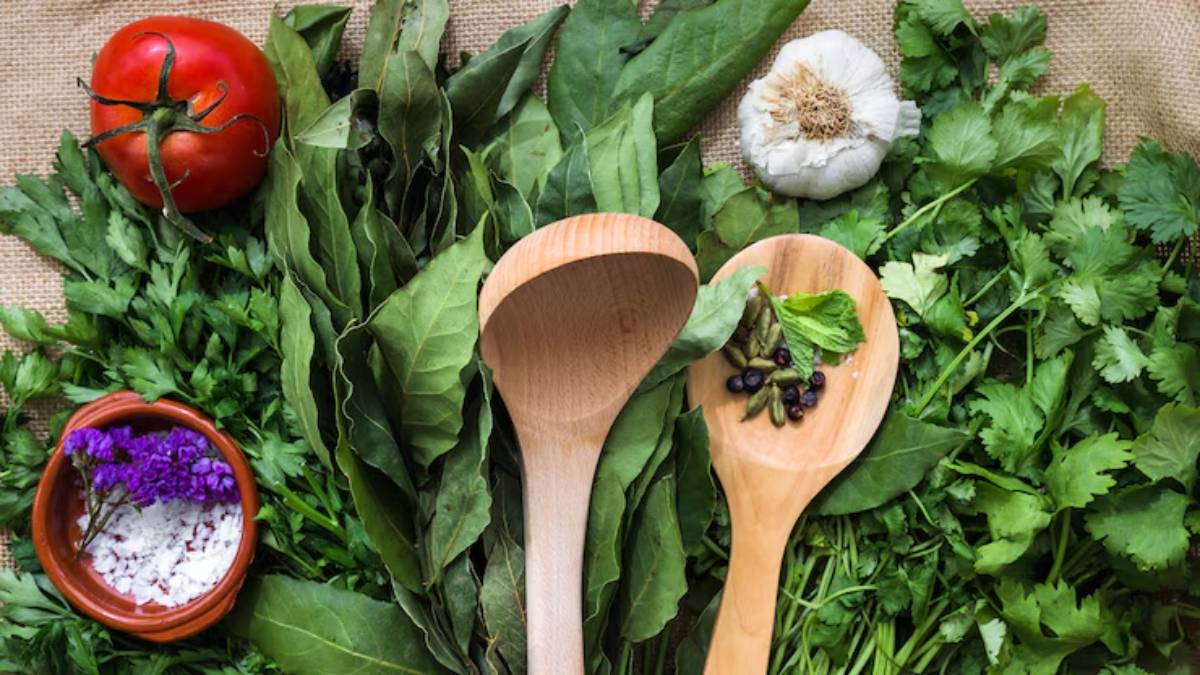
The Essential Mediterranean Herb List
1. Basil
- Sweet, peppery aroma
- Pairs with tomatoes, courgettes, pasta, and cheese
2. Parsley (Flat-leaf preferred)
- Bright, grassy, and slightly bitter
- Used as a garnish and main ingredient in tabbouleh
3. Oregano
- Robust, earthy flavour
- Often dried, but fresh offers delicate floral notes
4. Mint
- Refreshing and cool
- Great in salads, yoghurt dips, and tea
5. Dill
- Anise-like and grassy
- Used in sauces, seafood, and pickles
6. Rosemary
- Pine-scented and assertive
- Best for roasting and grilling
7. Thyme
- Woodsy and lemony
- Excellent in stews, marinades, and dressings
8. Coriander (Cilantro)
- Bright and citrusy
- Common in Mediterranean-meets-Middle Eastern dishes
Herb-boosted breakfast ideas to start fresh
- Scrambled eggs with parsley and dill: Stir in a handful of chopped herbs right before the eggs are done cooking. This adds great flavour and brightness.
- Avocado toast with mint and coriander: Add fresh herbs to mashed avocado for a Mediterranean touch.
- Yoghurt and herb dip: Combine Greek yoghurt with chopped mint, parsley, and a little garlic. This makes a tasty creamy dip for breakfast or a spread for toast.
- Herbed olive oil drizzle: Soak olive oil with rosemary or thyme overnight. Then, drizzle it over toast, poached eggs, or breakfast bowls.
- Herbal teas: Fresh mint or lemon balm leaves steeped in hot water make a calming, digestive-friendly tea.
Why it works: Starting your day with herbs adds flavour and nutrients without added salt or fat. These small touches make simple meals delicious and energising. They set a fresh tone for the whole day.
Every day, sauces & condiments with fresh herbs
- Chimichurri: Blend parsley, coriander, garlic, olive oil, and red wine vinegar. Ideal for grilled vegetables, meats, or bread.
- Herb vinaigrette: Combine chopped basil or oregano with olive oil, lemon juice, mustard, and honey. Drizzle over salads or grain bowls.
- Zesty herb pesto: Use walnuts or almonds instead of pine nuts. Mix basil, mint, or parsley with olive oil and Parmesan.
- Tahini-herb sauce: Mix tahini with lemon juice, garlic, and chopped parsley or coriander. Great on falafel, roasted veggies, or wraps.
- Yoghurt green sauce: Mix yoghurt, dill, mint, lemon juice, and cucumber. Use it as a quick dip or dressing.
Why it works: These herb sauces are very versatile. They add colour, creaminess, and depth to meals. They’re also great for meal prep—store in jars and spoon onto dishes throughout the week.
Cooking Techniques with Fresh Herbs
Raw Garnishing
- Chop herbs just before serving
- Sprinkle on salads, grain bowls, pasta, soups
Marinating and Infusing
- Combine herbs with olive oil, lemon juice, and garlic
- Use for fish, chicken, or aubergines
Steeping and Simmering
- Add robust herbs early in cooking (rosemary, thyme)
- Reserve delicate herbs for the final minutes (basil, dill)
Compound Butters and Oils
- Blend herbs with butter or olive oil
- Use for grilled veg or bread dipping
Fresh Herb Recipes from the Mediterranean
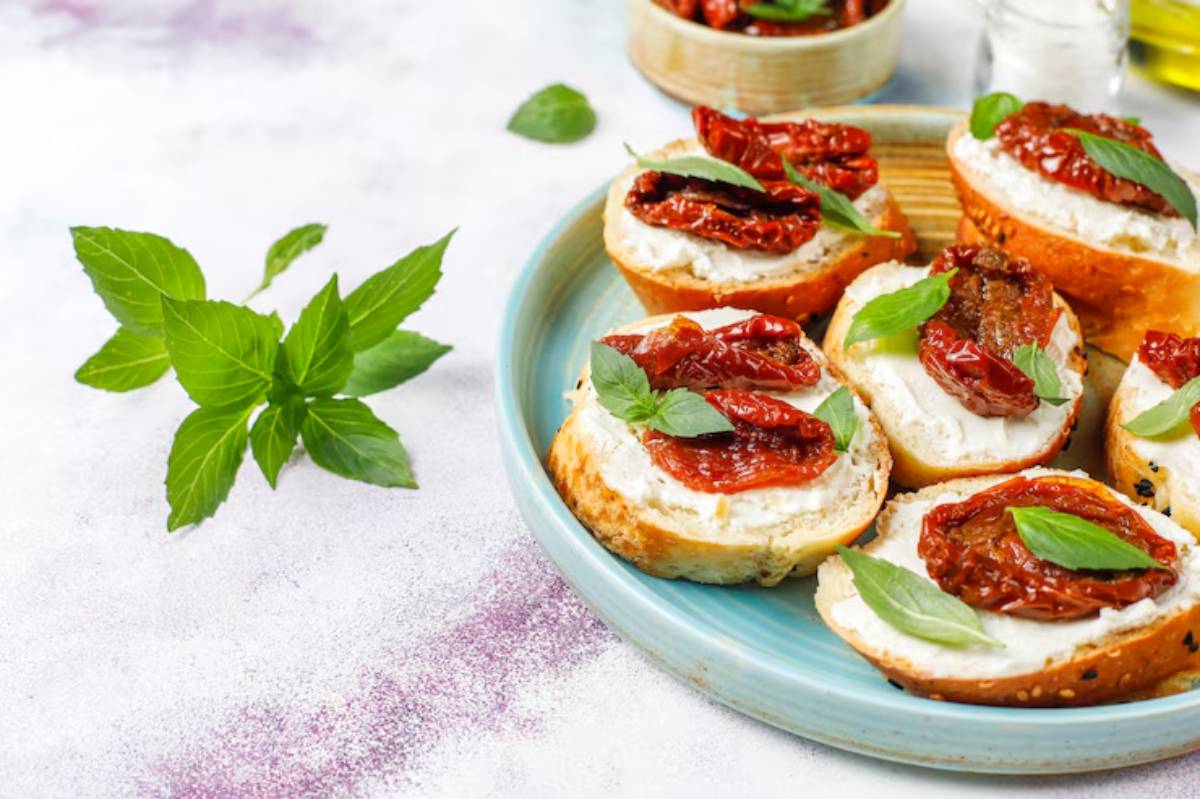
1. Tomato & Basil Bruschetta
- Diced tomatoes + fresh basil + olive oil + garlic on toasted bread
2. Tabbouleh
- Bulgur wheat, parsley, mint, tomato, cucumber, lemon juice
3. Herbed Greek Yoghurt Dip
- Yoghurt, mint, dill, garlic, and cucumber
- Perfect with warm pita or raw veg
4. Lemon-Herb Grilled Chicken
- Marinated in rosemary, thyme, oregano, and lemon juice
- Served with herby couscous
5. Zucchini Fritters with Mint & Dill
- Grated courgette, feta, herbs, and flour, pan-fried
6. Fresh Herb Couscous Salad
- Couscous with chopped parsley, coriander, mint, spring onion
7. Chickpea and Herb Stew
- Slow-cooked chickpeas with tomato, thyme, rosemary
8. Baked Feta with Herbs
- Feta wrapped in foil with oregano, thyme, garlic, and cherry tomatoes
Storing & Prepping Fresh Herbs
Short-Term Storage
- Wrap herbs in damp paper towels and refrigerate
- Use herb boxes or jars with water for parsley and coriander
Freezing Herbs
- Chop and freeze in ice cube trays with olive oil
- Use in cooking, not garnishing
Washing & Chopping Tips
- Rinse under cool water, dry thoroughly
- Use a sharp knife or herb scissors
- Avoid bruising delicate herbs
When to Use Fresh vs. Dried Herbs
Use Fresh:
- In uncooked dishes (salads, salsas)
- When a bright, leafy finish is needed
Use Dried:
- In slow-cooked sauces, soups, and roasts
- When you need more intensity (oregano, thyme)
If substituting dried for fresh, use 1/3 the amount
Weekly Meal Plan Using Fresh Herbs
Monday: Bruschetta with tomato and basil + herby lentil salad
Tuesday: Tabbouleh + lemon-herb chicken skewers
Wednesday: Chickpea stew with thyme + grilled aubergines
Thursday: Courgette fritters with yoghurt-mint dip
Friday: Baked feta with cherry tomatoes and oregano
Saturday: Couscous salad with mint and parsley + roast veg
Sunday: Rosemary-roast potatoes + grilled fish with dill butter
Conclusion: A Fresh Finish to Every Meal
The magic of Mediterranean cooking lies not just in ingredients, but in how you use them. Fresh herbs are more than garnish—they’re the threads that tie a meal together with freshness, fragrance, and flavour.
Whether you’re learning to use herbs for flavour or diving into a new recipe, adding a few sprigs of parsley or mint can elevate your dish from good to unforgettable. With this guide, you’re equipped to make every meal a celebration of simplicity and taste.
